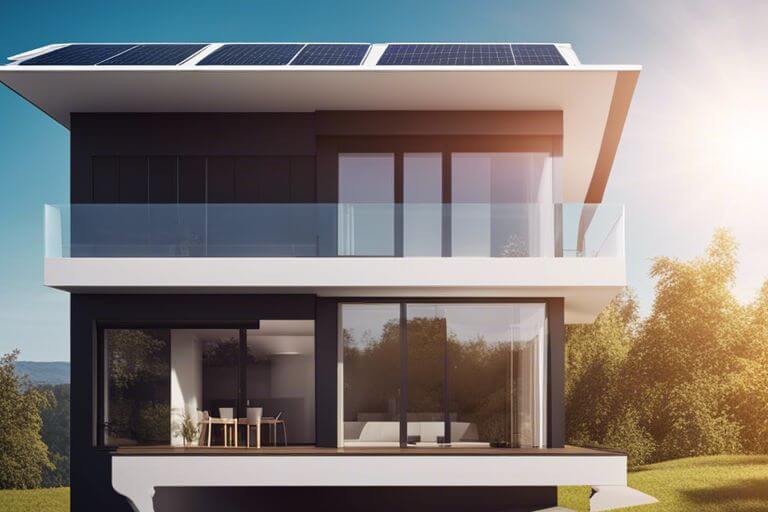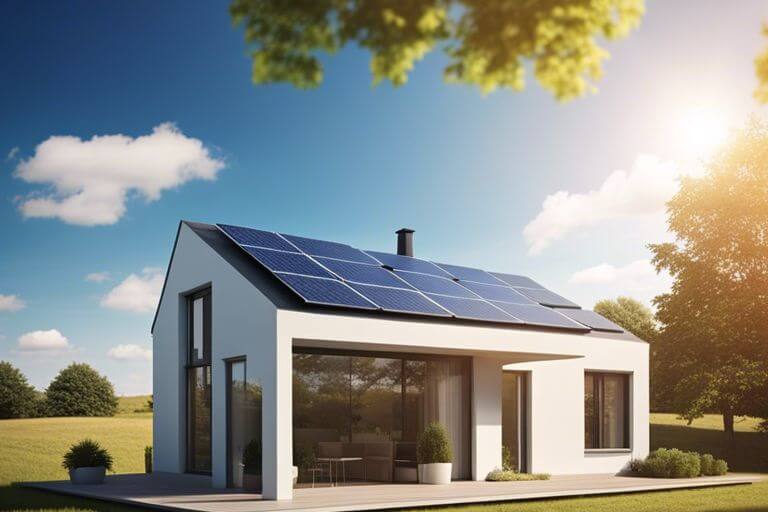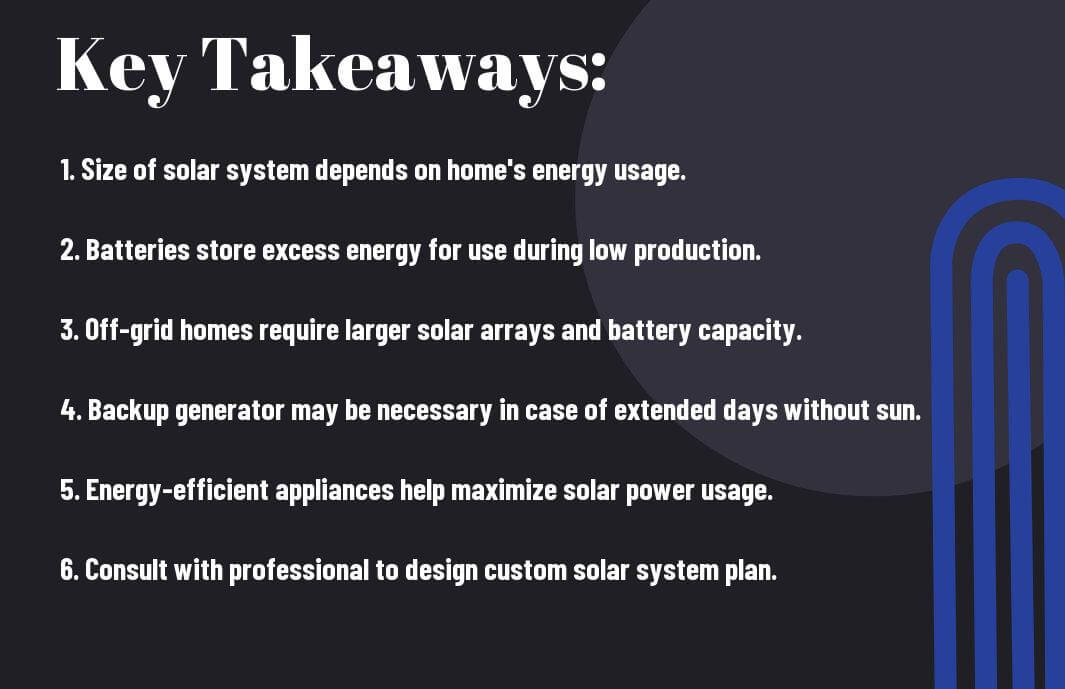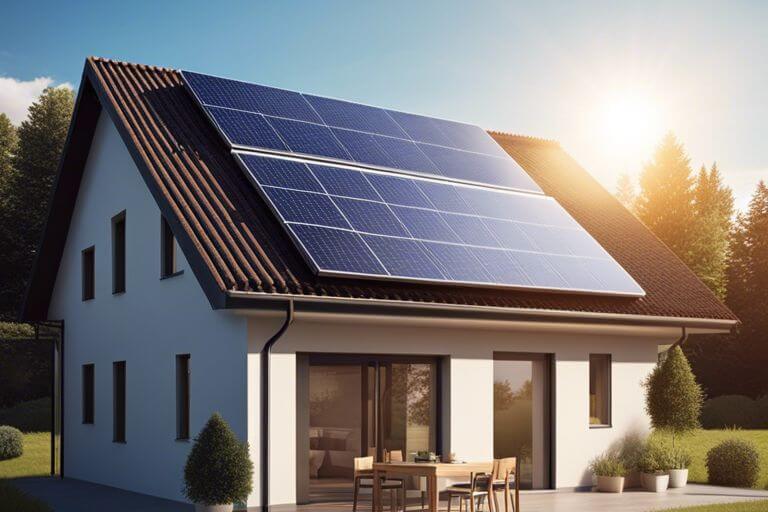You may be wondering if it’s possible to run your entire house on solar power and battery storage. In this informative blog post, we’ll explore the feasibility of this alternative energy solution. From understanding the capacity of solar panels to the efficiency of battery storage, you’ll gain a comprehensive insight into the potential of powering your home with renewable energy sources. Get ready to explore into the world of sustainable living and discover if you can truly run a whole house on solar and battery.
Key Takeaways:
- Solar panels can power a whole house: Properly-sized solar panels paired with a battery storage system can provide enough power to run a whole house.
- Consider energy usage and storage capacity: It’s necessary to evaluate your household’s energy needs and the capacity of the battery storage system to ensure uninterrupted power supply.
- Efficiency and cost savings: Running a house on solar and battery can lead to significant cost savings in the long run, while also reducing your carbon footprint.

The Basics of Solar Power
How Solar Panels Work
The concept of solar power is quite simple: solar panels on your roof absorb sunlight and convert it into electricity through a process called the photovoltaic effect. When sunlight hits the silicon cells within the solar panels, it knocks electrons loose from their atoms, allowing them to flow and create an electric current. This direct current (DC) is then passed through an inverter to convert it into alternating current (AC) which is used to power your home.
Advantages of Solar Energy
Solar energy offers numerous advantages for powering your home. By harnessing the power of the sun, you can significantly reduce your electricity bills and even eliminate them completely if your system generates enough power. Additionally, solar energy is a renewable resource, meaning it produces clean energy and reduces your carbon footprint.
Plus, solar panels require little maintenance and often come with long warranties, making them a reliable and cost-effective investment for your home. You can also take advantage of government incentives and tax credits for installing solar panels, further reducing the overall cost.
The Role of Batteries in a Solar-Powered House
You may wonder about the role of batteries in a solar-powered house. Batteries play a crucial part in this setup by storing excess energy generated by your solar panels during the day. This stored energy can then be used during the night or on cloudy days when solar production is limited. Batteries necessaryly act as a reservoir for the surplus energy produced by your solar system, allowing you to maximize your self-sufficiency and reduce reliance on the grid.
Types of Batteries Suitable for Home Use
You have several options when it comes to choosing batteries for your solar-powered house. It’s necessary to select a battery that suits your specific needs and budget. Lead-acid batteries, lithium-ion batteries, and flow batteries are some of the most common types used in residential solar setups. Each type has its own advantages and limitations, so it’s crucial to consider factors like capacity, lifespan, and maintenance requirements when making your decision. After weighing these factors, you can choose the best battery option to complement your solar system.
| Lead-Acid Batteries | Relatively low upfront cost but shorter lifespan and higher maintenance needs. |
| Lithium-Ion Batteries | Higher upfront cost but longer lifespan, higher efficiency, and lower maintenance requirements. |
| Flow Batteries | Less common in residential applications, but offer long cycle life and high energy capacity. |
| Nickel-Cadmium Batteries | Relatively high cost, but high energy density and long lifespan. |
| Saltwater Batteries | Environmentally friendly option with non-toxic materials and good lifespan. |
How Batteries Store Excess Energy
Types of batteries like lithium-ion batteries store excess energy by using a chemical reaction to store and release energy as needed. When your solar panels generate more electricity than your home can use, the excess energy is directed to the batteries for storage. The batteries then store this energy until it is needed, such as during the evening when solar production is low or during a power outage.
Energy storage systems are designed to optimize self-consumption of solar energy and provide backup power during grid outages. By storing excess energy in batteries, you can reduce your reliance on the grid and maximize the value of your solar investment. Additionally, storing energy allows you to take full advantage of time-of-use electricity pricing by using stored energy during peak rate periods.
Assessing Your Energy Needs
Once again, before you begin on the journey of running your whole house on solar and battery power, it is crucial to assess your energy needs accurately. This step is vital to determine the size of the solar panel system and battery storage capacity required to meet your household’s daily energy consumption.
Calculating Your Daily Energy Consumption
An important first step in assessing your energy needs is to calculate your household’s daily energy consumption. This can be done by reviewing your utility bills to understand your average daily kilowatt-hour (kWh) usage. By analyzing your past energy consumption patterns, you can estimate the amount of energy your solar and battery system will need to generate and store to meet your needs efficiently.
Identifying Energy-Hungry Appliances
Appliances such as air conditioners, electric water heaters, and clothes dryers are typically energy-hungry and can significantly impact your overall energy consumption. By identifying these energy-guzzling appliances in your home, you can make informed decisions about how to optimize their usage or invest in more energy-efficient alternatives to reduce your overall energy needs.
Your assessment of energy-hungry appliances should also consider the power requirements of these devices. Some appliances may have high starting or running power loads, which can affect the sizing of your solar panel system and battery capacity. By understanding the energy profiles of each appliance in your home, you can better plan for your solar and battery system to meet your specific needs effectively.
Sizing Your Solar Panel System
Determining the Ideal System Size
Your first step in sizing your solar panel system is to determine the ideal system size based on your household’s energy needs. Panel placement, roof size, and energy usage are crucial factors to consider when deciding on the size of your solar panel system. It’s crucial to calculate your daily energy consumption to ensure you have enough panels to meet your needs.
Factors Affecting System Performance
System performance can be affected by several factors, including shading from trees or nearby structures, the angle and orientation of your roof, and the efficiency of your solar panels. This can impact the amount of sunlight your panels receive and, consequently, the energy production of your system. It’s important to assess these factors to maximize the performance of your solar panel system.
- Shading from trees or structures
- Roof angle and orientation
- Solar panel efficiency
Solar panels work by converting sunlight into electricity through photovoltaic cells. The efficiency of these cells plays a significant role in determining how much energy your system can generate. Higher efficiency panels can produce more electricity in limited space, making them a popular choice for residential solar installations.

Integrating Solar and Battery Systems
To ensure your home can run entirely on solar and battery power, it’s important to understand the components that make up a successful setup. If you’re wondering how many solar panels you need for your specific requirements, Wondering How Many Solar Panels You Need? Here’s a …
Inverters and Charge Controllers
Any successful solar and battery system integration requires inverters and charge controllers. The inverter converts the direct current (DC) generated by the solar panels into alternating current (AC) that can power your home. Charge controllers manage the flow of electricity from the solar panels to the batteries, ensuring they are charged safely and efficiently. Investing in high-quality inverters and charge controllers is crucial for maximizing the effectiveness of your system.
Monitoring and Control Systems
To optimize the performance of your solar and battery system, you need monitoring and control systems in place. These systems allow you to track the energy production of your solar panels, monitor battery levels, and adjust settings to improve efficiency. By staying informed about how your system is performing, you can make adjustments as needed to maximize your energy savings and ensure a reliable power supply.
A comprehensive monitoring and control system can also alert you to any issues or malfunctions, allowing you to address them promptly and prevent potential downtime. With real-time data at your fingertips, you can make informed decisions to optimize your energy usage and reduce overall electricity costs.
Overcoming Common Challenges
Dealing with Intermittent Energy Supply
After installing a solar and battery system to power your whole house, you may encounter challenges with intermittent energy supply. This means that the system may not always produce enough energy to meet your household’s needs, especially during times when the sun isn’t shining or when there is heavy cloud cover. To overcome this challenge, you can consider installing a backup generator that can automatically kick in when your solar and battery system is not producing enough energy.
Managing Energy Storage and Backup
Supplying your whole house with solar and battery power requires effective management of energy storage and backup. It’s crucial to properly size your battery storage system to ensure you have enough energy stored to power your house during periods of low solar production or at night. You should also consider investing in a smart energy management system that can optimize energy usage and prioritize which appliances receive power during times of limited energy supply. This can help you make the most out of your solar and battery system.
Additionally, having a backup energy source, such as a generator or access to the grid, can provide you with extra assurance during extended periods of low sunlight or unexpected system failures. By carefully managing your energy storage and backup options, you can ensure that your whole house remains powered and comfortable throughout any situation.
Overcoming the common challenges of intermittent energy supply and managing energy storage and backup is crucial to successfully running your whole house on solar and battery power. By implementing the right solutions, such as backup generators and smart energy management systems, you can optimize the performance of your system and ensure a reliable power supply for your household. With careful planning and management, you can enjoy the benefits of renewable energy while maintaining a comfortable and sustainable home.

To wrap up
With this in mind, you now have a better understanding of whether you can run a whole house on solar and battery. It is certainly possible to power your entire home using solar panels and battery storage systems, but it requires careful planning and consideration of your energy needs. If you’re interested in learning more about this topic, you can read further information from Can I Run My Whole House on Solar Power?. Recall, making the switch to a solar-powered home can be a sustainable and cost-effective choice for the environmentally conscious homeowner.
Q: Can you run a whole house on solar and battery?
A: Yes, it is possible to run a whole house on solar and battery power. By installing a solar panel system on your roof to generate electricity and using a battery storage system to store excess energy for use during nighttime or cloudy days, you can power your entire household without relying on the grid.
Q: What are the benefits of running a whole house on solar and battery?
A: There are several benefits to running a whole house on solar and battery power. These include lower energy bills, reduced reliance on the grid, increased energy independence, and a smaller carbon footprint. Additionally, solar and battery systems can provide backup power during grid outages, ensuring that your household remains powered during emergencies.
Q: What factors should be considered when determining if a whole house can run on solar and battery?
A: When considering whether a whole house can run on solar and battery power, you should take into account your household’s energy consumption, the amount of sunlight your location receives, the size and efficiency of the solar panel system, the capacity of the battery storage system, and any energy-efficient appliances or practices in your home. It is also important to consult with a professional solar installer to assess your specific energy needs and design a system that meets those requirements.
